Britain’s railway network ground to a crawl on Wednesday after 40,000 staff walked off the job in a dispute over jobs, pay and working conditions. Train companies said only about a fifth of services across the country were due to run.
The 24-hour strike by cleaners, signallers, maintenance workers and station staff comes a month after the country’s most disruptive rail walkout in three decades brought trains to a halt across the UK at the start of the summer holiday season.
The dispute centres on pay, working conditions and job security as Britain’s railways struggle to adapt to travel and commuting habits changed – perhaps forever – by the coronavirus pandemic. There were almost 1 billion train journeys in the UK in the year to March, compared to 1.7 billion in the 12 months before the pandemic, and rail companies are looking to cut costs and staffing after two years in which emergency government funding kept them afloat.
Negotiations aimed at resolving the dispute are deadlocked. The National Union of Rail, Maritime and Transport Workers says employers’ latest pay offer falls short amid soaring inflation – currently at 9.4% – and the worst cost of living crisis in decades and accuses the Conservative government of preventing train companies from making a better offer.
The government says it is not directly involved in the dispute pitting the union against privately owned train-operating companies and the government-operated Network Rail infrastructure firm.
Transport Secretary Grant Shapps said the strike had been “cynically timed” to disrupt a semi-final of the European women’s soccer tournament on Wednesday in Milton Keynes, north of London, and the opening of the Commonwealth Games in Birmingham on Thursday.
The union staged three one-day strikes last month that stopped services across much of the country. More strikes are planned for Saturday, when train drivers are set to walk out, and on three days in August.
Polls suggest public opinion is split, with many people expressing sympathy for the rail workers.
“The workers have a right to strike,” said commuter Fabrice Kabamba at London’s Waterloo station. “As an employee myself, struggling to pay bills, I can sympathize with them.”

